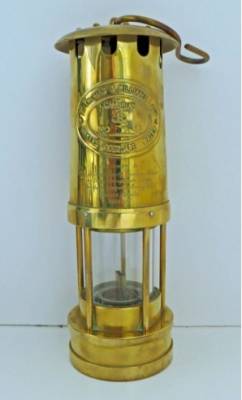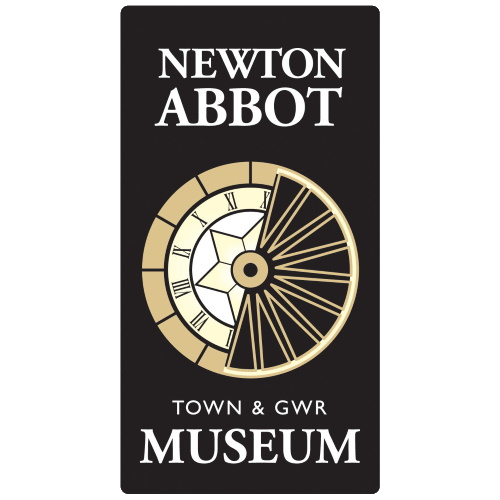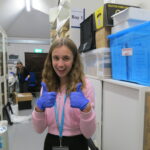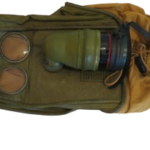
The Miner’s Lamp
- by naadmin337
- in Museum
- posted May 20, 2019
Di Nicholls[2] wished that the Miners Lamp presented to her in 1985 by the Miners of the Treharris Deep Navigation Mine, should be donated to the Newton Abbot & GWR Museum.
This is the story behind the Miner’s Lamp.

In 1983 Ian MacGregor was appointed the head of the National Coal Board and he made the case that it would be cheaper to import coal from Australia., USA, Columbia and Poland etc., rather than continue mining in the UK. Consequently the decision was taken to begin the closure of 20 pits mainly in the North with the loss of 20,000 jobs, with the remainder to follow; this was vigorously opposed by the National Union of Mineworkers and a strike was called in March 1984. The Coal Board expecting such a reaction had been stockpiling coal for some-time and this had inflamed the situation even more.
The economic case for importing coal was probably sound, although this was not universally accepted by some economists; however whether sound or not it took no account of the hardship that would be imposed on the Mining Communities.
All the mining areas suffered from this policy, as mining was often the only industry in the area and this was particularly the case for the miners and communities in South Wales. These mines were mostly situated in isolated villages, where almost everybody was either directly involved in mining or associated services, consequently South Wales suffered hugely with deprivation and community breakdown, which lasted for years afterwards.
This breakdown was exacerbated by the banning of urgently needed payments to dependents of any striker, whose name had been taken by the police, leaving families with no work and no means of support apart from intermittent payments by the Unions.
To minimise the effect of the strike there was a strategy to import coal through the smaller non-unionised ports and Teignmouth was one of them. The miners were aware of this and organised pickets to dissuade dockers from handling coal – especially where they had no proper machinery for doing so.
Miners from Treharris Deep Navigation Pit in South Wales were assigned to Teignmouth Docks and they were accommodated in the Labour Party Rooms in Highweek.
On May Day 1984 a heavy shipment of Polish Coal arrived at Teignmouth Docks, and the South Wales Miners began picketing the dock. They were decent civilised people threatened with the complete loss of their livelihoods, but they were not able to convince sufficient numbers of dock-workers not to cooperate in the handling of coal.
There was considerable amount of sympathy by local people, the miners being invited into homes and hotels of sympathetic owners. Street collections were organised throughout Teignbridge for their families, in addition to collections for food and clothes. Local supporters, including some Teignmouth dock workers, visited the families in Treharris and were horrified at the working conditions of the miners.
But it was all too late, the miners themselves were divided from the start, by promises that some pits would not close, (but were soon afterwards) and they began to drift back to work and the strike was formally called off in March 1985
The Treharris Miners, accepted defeat in good grace and with the warmest thanks to their supporters in Teignbridge. Many retain links with the ex-Miners for nearly 30 years
To thank the Teignbridge Support Group and the People of Teignbridge, the Wives of the South Wales Miners, gave a number of Presentation Miners Lamps to those who had helped them during the Strike, of which Di Nicholls received the one to be donated to the Newton Abbot & GWR Museum.
The Strike finally ended on the 3rd March 1985, with the Mines continuing to be shut, so that of the 174 working pits in 1983, only 6 remained in 2009. Obviously, today with the drive to reduce the use of fossil fuels, the elimination of coal as a major player in the energy market is to be welcomed, but it was done purely as part of a broad-brush economic strategy, without consideration to the lives and wellbeing of Miners their families or communities.
Di Nicholls commented on the Strike:
“We should always try to look beyond immediate events and understand why things happen as they do. Maybe some pits had to close; maybe we no longer need all this coal. But the way the Miners were completely deprived of their only source of livelihood was unforgivable. Humanity demands that we find better ways of organising our affairs. I would like all thinking people to be aware of the significance of this lamp, which is why I am donating it to Newton Abbot & GWR Museum”
[1] The Miner’s Lamp will be part of the Newton Abbot & GWR museum collection when the new Museum opens in 2020.
[2] Di Nicholls B.E M, Former Mayor of Newton Abbot 1985/1986, Teignbridge District and Town Councillor, Chair Teignbridge Labour Party, School Governor, Museum Volunteer, Honorary Freewoman of Newton Abbot.




